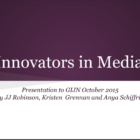gijc2015
Research: “Accountability Information, Across Borders”
|
This paper explores the efficacy and potential of increased journalistic and academic data, research and reporting collaboration, in the context of credible, accountability information. Investigative journalists throughout the world understandably cherish their independent “watchdog” function.
Professional news organizations and individual journalists traditionally have not been particularly collaborative with scholars in the academic community (beyond perfunctorily quoting them in their stories), even though their interests, expertise, research and writing are often about quite similar subject matter. And of course, at the same time, the university milieu, the “academy,” has seemed distant and disengaged from civic life and current events issues because, too often, it is.



